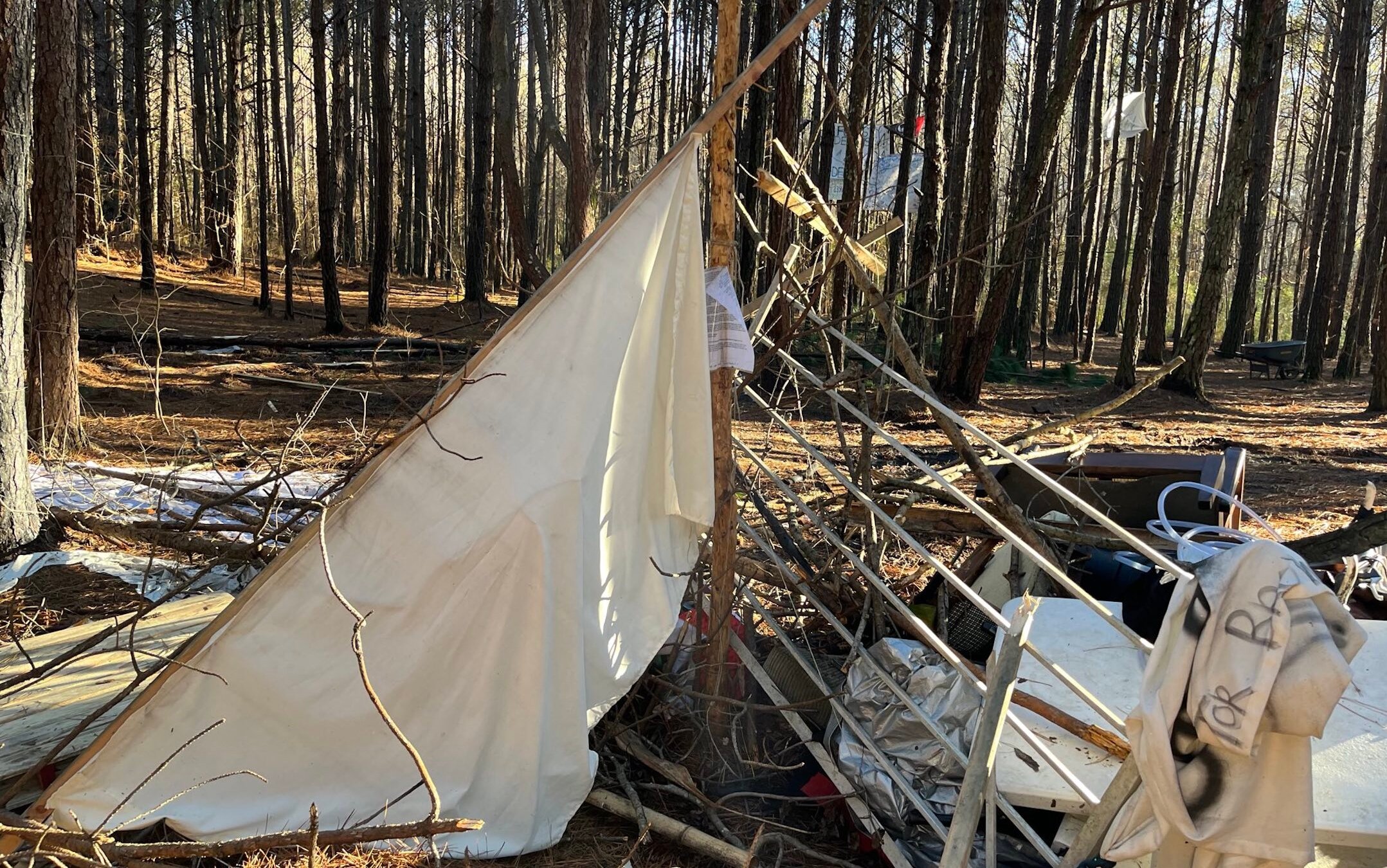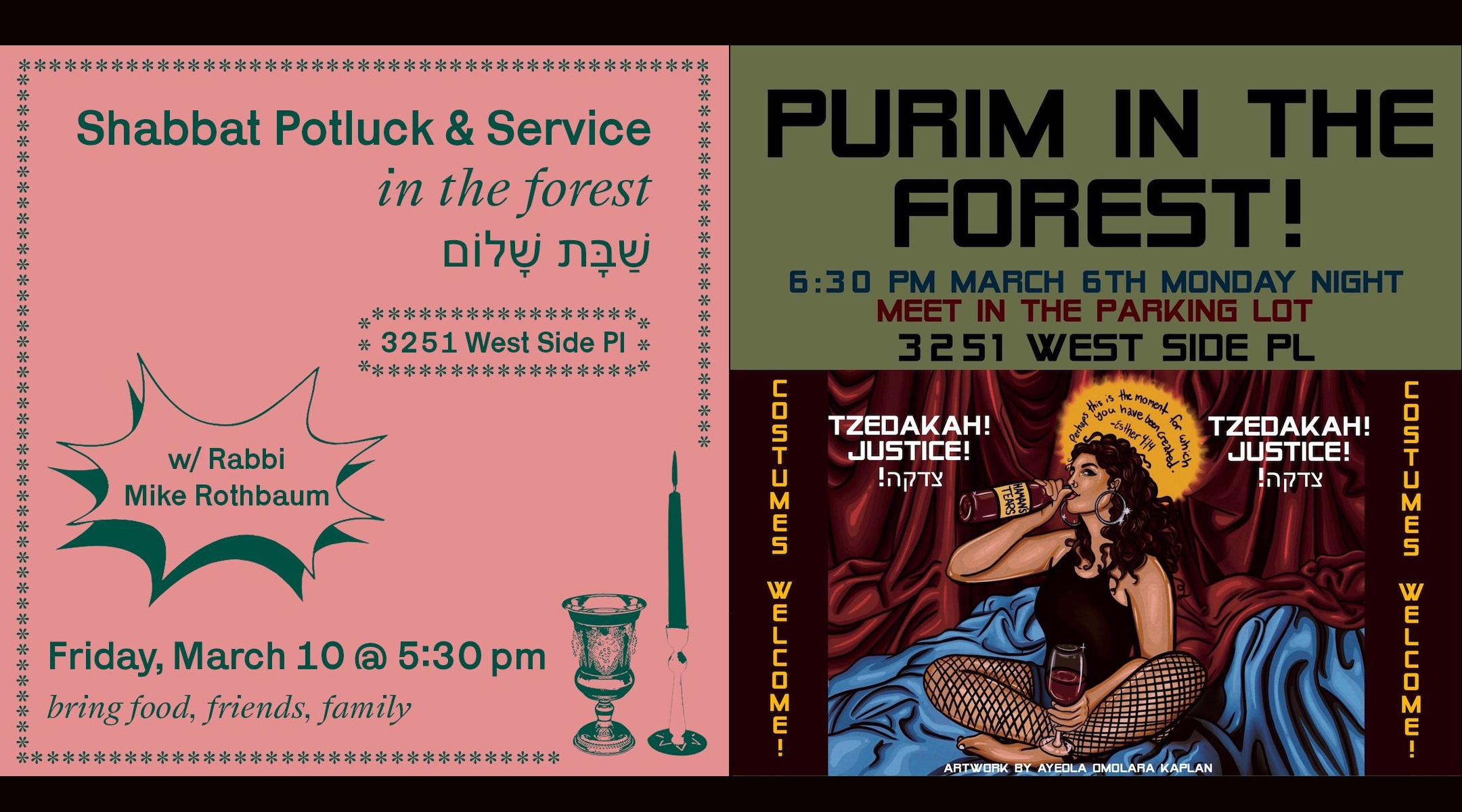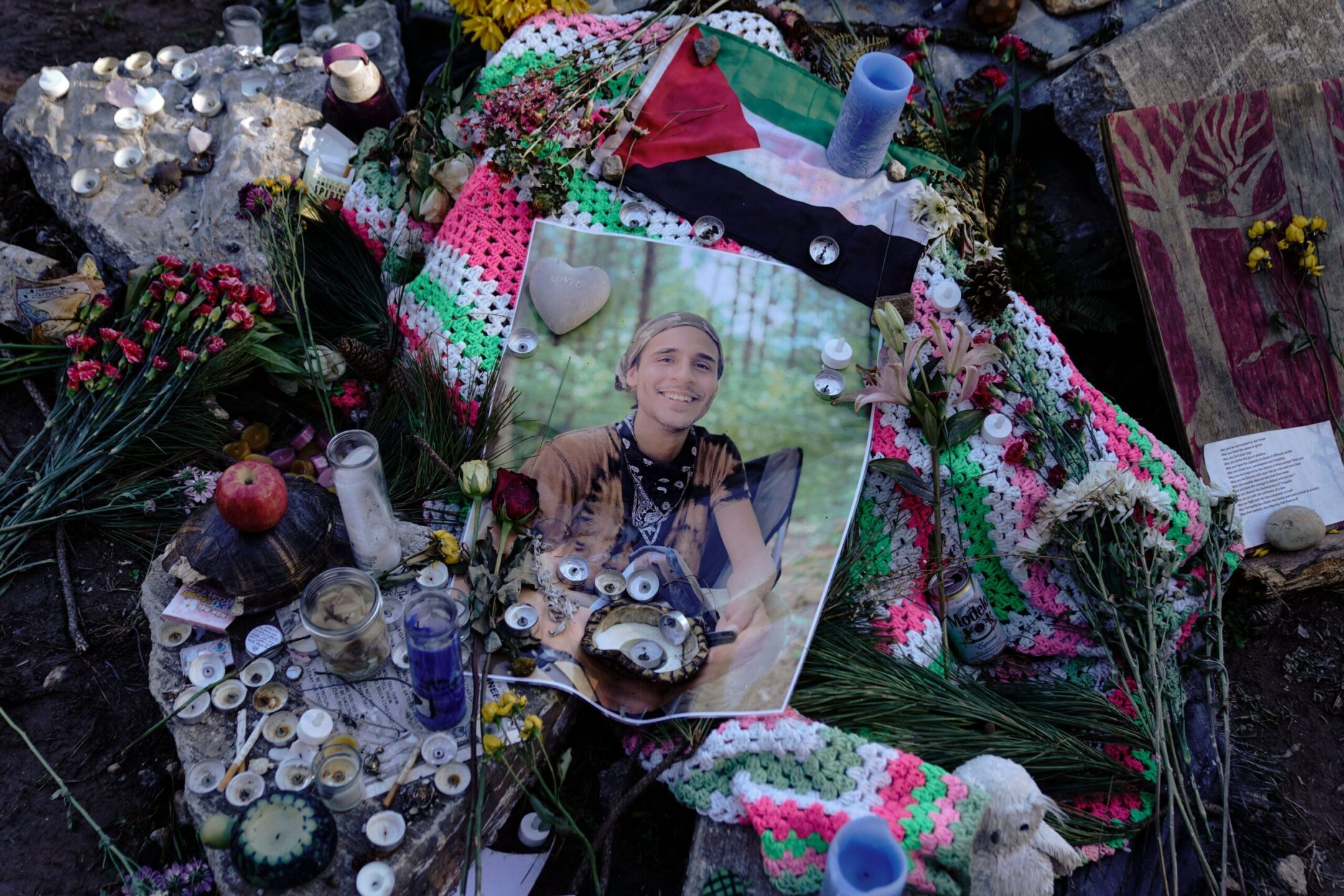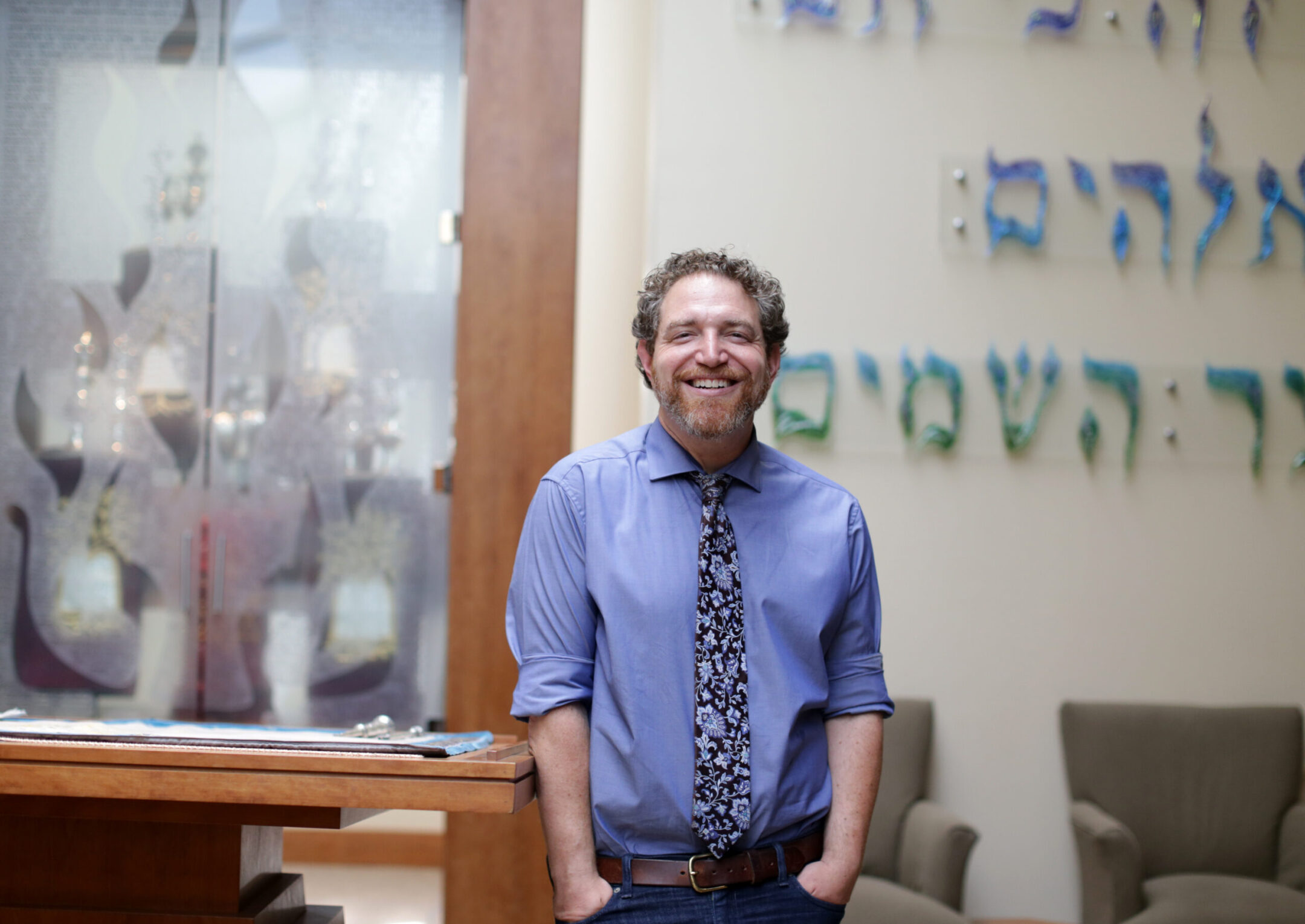‘Stop Cop City’ activists infuse Jewish rituals into their protest against Atlanta’s planned police training center
Renewed protests turned violent over the weekend, throwing into question plans for Purim and Shabbat observances in the woods

The remnants of the sukkah at the “No Cop City” protest in a forest in Atlanta, where Jewish activists are joining a fight against the construction of a police training facility. (Courtesy Fayer Atlanta)
(JTA) — As the sun set on Feb. 5, signaling the start of Tu Bishvat, a group of Jews carried shovels into the South River Forest southeast of downtown Atlanta.
In the day’s declining light, they planted saplings — seven paw paws, three fig and two peach — to honor the holiday, Judaism’s “new year of the trees.” They recited the Shehechiyanu prayer, and a rabbi led them in singing “Tzadik Katamar”: “The righteous shall flourish like the palm tree and grow like a cedar in Lebanon,” from Psalm 92.
The traditional holiday observance doubled as a protest against “Cop City,” the name that self-described “forest defenders” have given the city of Atlanta’s plan to build a $90 million, 85-acre police and fire training center on 300-plus acres that it owns just over the city line in DeKalb County, Georgia.
Two years into protests against the plans, a “week of action” that began over the weekend swelled the protesters’ ranks and brought an even greater police presence to the site of the planned training center. On Sunday night, a group of activists broke from a nonviolent protest, burning police vehicles and, police said, throwing rocks at officers. Dozens of people were arrested.
The violent turn throws into question other plans for the week, which include a Purim celebration on Monday night and a Shabbat service on Friday, the latest Jewish milestones in nearly two years of controversy and confrontation.
“They’re living Jewish values more legitimately, more sincerely than some of the biggest institutions,” said Rabbi Mike Rothbaum of Atlanta’s Reconstructionist Congregation Bet Haverim, of the Jewish protesters. Rothbaum attended the Tu Bishvat event and is scheduled to lead this week’s Shabbat service; he was speaking before the weekend’s events.
Comparing their worship to a mishkan, the portable sanctuary that the Israelites carried in the desert, Rothbaum said of the protesters, “They go to shul at ‘Cop City.’”

Until about 200 years ago, South River Forest was home to the Muscogee (Creek) tribe, who called it Weelaunee — “brown water,” the name painted on protest banners strung between trees. White settlers drove out the Muscogee, and the land later became a slave plantation, a Civil War battlefield and a city prison farm. Portions have been a police firing range and used for explosives disposal, and it has also been the site of illegal dumping.
In April 2021, Atlanta announced plans to build a police training facility in the forest. Opponents immediately launched a protest. They oppose the redirection of natural resources to the police and want the forest maintained as a natural sanctuary.
After two years as a primarily local issue, national and international attention spiked on Jan. 18, when a protester camped in the woods was killed during what police called a “clearing operation.” The Georgia Bureau of Investigation said Manuel Paez Teran fired a handgun, wounding a Georgia State Police trooper, then was killed by return fire. An independent autopsy reported that the 26-year-old known as “Tortuguita” was struck by at least 13 rounds. An Atlanta police vehicle was torched in a subsequent protest downtown. Charges against more than a dozen of those arrested include violating the state’s domestic terrorism statute.
Across Intrenchment Creek from the city property is a DeKalb County park that bears the waterway’s name and is the subject of an associated protest. Much of the “Stop Cop City” activity has taken place in the 136-acre Intrenchment Creek Park. Legal challenges are pending against a land swap in which the county gave 40 acres to the now-former owner of a film studio, whose crews leveled trees and tore up a paved path until a judge issued a stop work order.
Conservation groups and community organizations in the surrounding majority Black neighborhoods fear that any development will degrade the tree canopy in Atlanta — which calls itself the “city in the forest” — and exacerbate flooding in low-lying areas.
The larger, decentralized protest movement includes a number of Jews, most in their 20s and 30s, who have made their stand by holding Jewish rituals in the forest, some under the banner of the “Jewish Bird Watcher Union.” They have held Shabbat services, performed the Tashlich ritual on Rosh Hashanah, slept in a sukkah during Sukkot, lit Hanukkah candles, and planted trees on Tu Bishvat. Prayer books were adapted for Shabbat and the High Holidays, with illustrations by the Jewish artist Ezra Rose.

Most of the Jewish events have been held in Intrenchment Creek Park. At the entrance, signs attached to a crumpled gazebo denounce the “film site” property owner. Improvised memorials and slabs of stone bearing spray-painted slogans dot the parking lot. To frustrate machinery drivers, some trails were blocked by barricades formed from downed trees, discarded tires and anything else handy.
The day before Tu Bishvat, three of the young Jewish activists met with a reporter, in an unheated community center a short drive from the forest. Expressing concern about their personal security, given the heated atmosphere around the issue, they spoke on condition that they be identified only by their first names and that their photographs not appear.
Cam, 24, is a labor union activist who grew up in Atlanta, attending Conservative and Reform congregations. Ray, 24, is a software engineer and Georgia Tech graduate, who grew up attending a Reform synagogue in Maryland. Ruth, in her late 20s, works in “regenerative landscaping” and moved to Atlanta with her Israeli family as a child. All said they feel disconnected from the mainstream Jewish community in Atlanta, religiously, politically and ideologically.
“Mainstream Judaism has completely lost touch with the radical history and radical tradition of the Jews,” Ruth said. “The things I like about Judaism, I want to live them in real life.”
She added, “When Sukkot came around and we built a sukkah in the forest, this is the closest I’ve been to relating to the story of traveling, of being in the desert and sleeping under the canopy.”

Upwards of 50 to 60 Jews have participated in the forest-based worship, and hundreds of people have streamed into the “living room” section of the woods. “I don’t know if they’re all gathering for Shabbat or not but they all gathered around with us and listened to us sing prayers and light candles,” Ray said.
Rothbaum said he admired what he saw the Jewish protesters doing. “Whatever your opinion of the activists at ‘Cop City,’ you have to admire their commitment,” he said, adding, “These kids are reacting to the assimilation of a great heritage of meaning and justice.”
The sukkah survived for two months past the end of Sukkot, until a Dec. 13 police raid against encampments on both sides of Intrenchment Creek. A photo posted on Twitter showed the dismantled poles and torn sheets. The disappearance of the large menorah from the Intrenchment Creek parking lot after Hanukkah was blamed on crews working for the film site owner.
May the candle lights of Khanukah ignite the flames of rebellion. @defendATLforest pic.twitter.com/kdh6mqhMHY
— Fayer - פֿײַער (@FayerAtlanta) December 22, 2022
The morning after Tu Bishvat, city and county SWAT teams, along with state police, were deployed as construction equipment was brought into the police training center site. Two weeks later, at a Shabbat dinner in the forest following the Jan. 18 raid, attendees recited a Mourner’s Kaddish for Manuel Paez Teran and sang the traditional prayer “Oseh Shalom Bimromav” — “They who make peace in their high places.”
The Jewish activists see parallels between their activism on the Israeli-Palestinian conflict and what’s happening in their local forest.
“Anti-Zionism was a major part of what brought us together in the first place, even before the forest movement,” said Cam, who said he saw the two issues as “related struggles.” Opposing Israel is “a big part of what leads us to feel alienated from most mainstream Jewish communities and the inability to be accepted there, and the necessity of forming our own.”
Ruth participated in activism on behalf of Palestinians while visiting family in Israel last summer. “I was hearing and seeing old ancient olive orchards that were destroyed, burned or cut by settlers in order to disempower Palestinians from living there,” she said. “It made me really feel, like, defend the forest everywhere.”
Atlanta officials say they do not plan to defile the forest and argue that the city’s police training facilities are inadequate. The planned complex would serve the police and fire departments, the 911 call center and K-9 units. It would include a shooting range, a “mock city” (with a gas station, motel, home and nightclub) and a “burn building.” The remainder of the land will be developed for recreational use, officials say.
“This is Atlanta and we know forests. This facility will not be built over a forest,” Atlanta Mayor Andre Dickens said at a January news conference. “The training center will sit on land that has long been cleared of hardwood trees through previous uses of this site decades ago.”
Activists accuse the city and county of a lack of transparency throughout the process. In a February interview with the Atlanta Journal-Constitution, Dickens conceded that the city could have done a better job selling the project. “We didn’t do that. And because we didn’t do that it started getting painted by anybody that had a brush,” he told the newspaper.
The mayor’s words have not deterred activists, whose goal is nothing less than cancellation of the project.
“They have destroyed a lot of the beauty already,” Cam said. “They have created this place of desolation and death and destruction, and that is in opposition to our task as Jews to create a world of beauty and joy and holiness. By coming to this place and planting trees, we are reclaiming it, making a place of peace and joy.”

The local Jewish protesters have lately gotten a boost from a progressive Jewish organization based in Philadelphia. The Shalom Center launched in the 1980s to oppose nuclear proliferation and now focused largely on climate justice.
“Our sacred text is called ‘The Tree of Life,’” wrote the center’s founder, Rabbi Arthur Waskow, and national organizer Rabbi Nate DeGroot in a Feb. 28 letter to Georgia Gov. Brian Kemp that noted Jewish law’s prohibition on uprooting trees. “We pray that the trees of the Weelaunee Forest remain trees that support the flourishing of sacred life for generations to come.”
Rothbaum said he was inspired by the young Jewish activists. “They are reminding us of the Jewish values that come to us through Torah, through the rabbinic writings, that are timeless,” he said. “They are reminding us of what we’re supposed to be. And we owe them a debt of gratitude.”
Ruth had a message for Atlanta’s Jewish congregations and communal organizations, most of which have not engaged publicly on the issue: “I would invite them to join us, to put their Jewish values into action,” she said. “Everything we’re doing here is really Jewish.”
This article originally appeared on JTA.org.
A message from our Publisher & CEO Rachel Fishman Feddersen

I hope you appreciated this article. Before you go, I’d like to ask you to please support the Forward’s award-winning, nonprofit journalism so that we can be prepared for whatever news 2025 brings.
At a time when other newsrooms are closing or cutting back, the Forward has removed its paywall and invested additional resources to report on the ground from Israel and around the U.S. on the impact of the war, rising antisemitism and polarized discourse.
Readers like you make it all possible. Support our work by becoming a Forward Member and connect with our journalism and your community.
— Rachel Fishman Feddersen, Publisher and CEO























